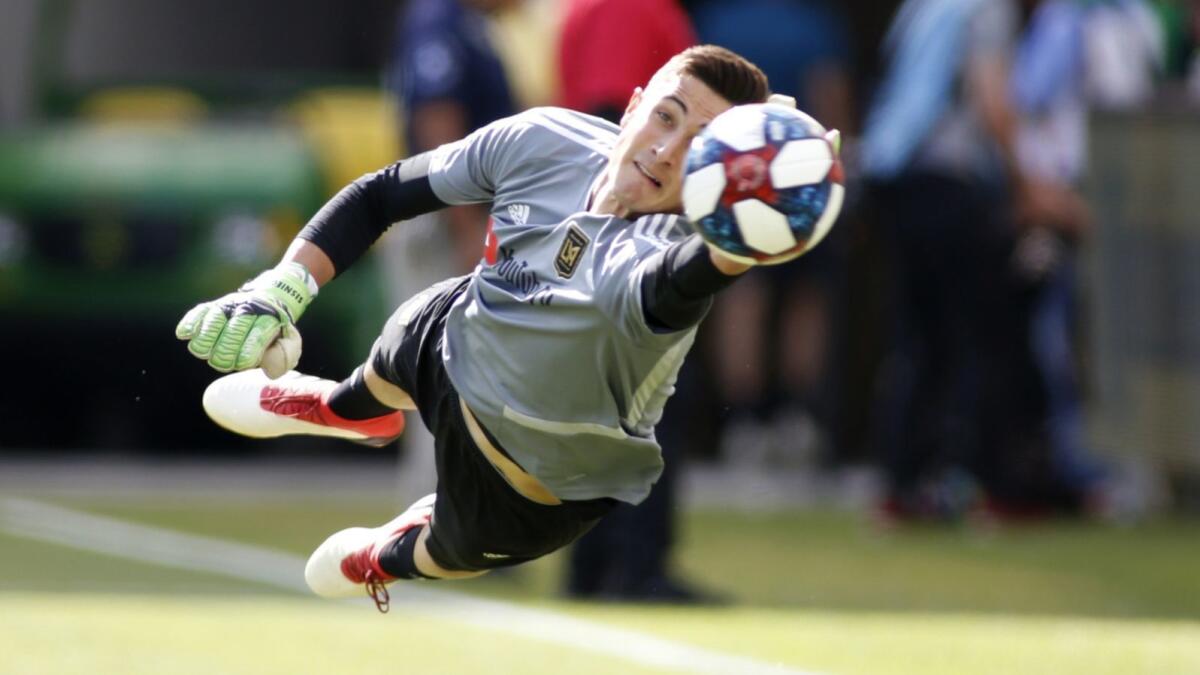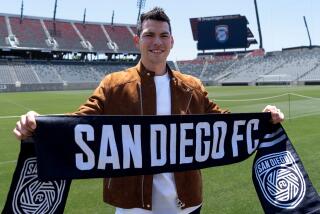LAFC’s Pablo Sisniega grateful to be pursuing his dream after nearly dying

- Share via
Pablo Sisniega lifted his gray practice jersey and revealed a scar that started at his belly button and ran up five inches, maybe six.
“They opened me up,” he said, unleashing an infectious giggle on the back patio of LAFC’s training facility.
The giggle was heard countless times over a conversation that covered everything from the 23-year-old goalkeeper’s Olympian parents to the series of misfortunes he experienced in Spain, the last of them a ruptured spleen that nearly cost him his life.
The near-death experience changed his perspective.
“I used to be very, very hard on myself,” Sisniega said. “I used to put an immense amount of pressure on myself when I played games. Now, I take it as, ‘This could be your last game. You have to take advantage of it, have fun.’”
So rather than dwell on how he wasn’t physically ready to compete for a starting position in training camp, he thanks LAFC’s training staff for strengthening his body over the last few months.
And instead of stewing over the time he’s spent on the bench, he’s made it a point to the enjoy the games he’s played in the absence of starter Tyler Miller, who is with the U.S. national team in the Gold Cup.
Sisniega will start his third game for LAFC on Friday at Colorado.
His disposition in part be can be traced back to his mother, Christina Fink, a sports psychologist who works with Major League Soccer’s Philadelphia Union.
Fink held Mexico’s high jump record for more than 20 years and represented the country at the 1988 and 1992 Olympics.
Sisniega’s father, Ivar, competed for Mexico in the modern pentathlon at the 1980, 1984 and 1988 Games. Ivar was Mexico’s flag bearer at the opening ceremony of the 1984 Games in Los Angeles, which were at the Coliseum – next door to Banc of California Stadium, which LAFC calls home.
“Good genes,” LAFC coach Bob Bradley quipped.
Sisniega was born in Mexico City in what he described as a bilingual and bicultural family. Both of his parents have American mothers. Holidays were sometimes spent with Fink’s family in the Philadelphia area.
“Ivar and I decided we would speak English in the home,” Fink said, explaining why her son speaks the language without any accent.
As a 17-year-old, Sisniega went on trial with Real Sociedad of the Spanish first division. He broke his nose and jaw in a collision during the tryout, a sign of what was to come.
In later years, while playing for Real Sociedad’s “B” team, Sisniega developed problems with his right shoulder. When conservative treatment failed, he underwent surgery. He hadn’t played a game in a year and a half when he returned to field last October.
His excitement soon transformed into dread.
“In the 77th minute, I went out to punch a ball, got the ball, actually hit a guy who was in front of me, but a guy hit me on the side and ruptured my spleen,” Sisniega said. “At the time, I didn’t know. It was very painful, but I just thought he had knocked the wind out of me.”
He finished the game. The pain persisted for hours.
“I couldn’t walk,” he said. “I ended up going to my girlfriend’s house and I start passing out there. Her mom’s a nurse and they did everything right. They called an ambulance.”
What he didn’t know was that he was bleeding internally. He underwent a 3 ½-hour emergency operation, after which a doctor told him he lost close to 3 liters of blood. The average adult has between 4.5 and 5.5 liters of blood in his body.
“The doctor told me that it was a miracle I was alive,” Sisniega said.
He was told that if he didn’t have the strength of a professional athlete, he could have died. His mother, who rushed from the United States to his bedside, recalls a doctor telling him that if he had shown up to the hospital 20 minutes later, he would have died.
“I started to think, ‘Maybe this just isn’t meant to be,’” Sisniega said. “I just felt like every time I would get close to achieving my goals, something drastic would happen to impede it.”
He had other options.
In addition to be being multilingual and multicultural, his family is also academically inclined. His mother has a doctorate in sports psychology. His father has degrees from Stanford and Arizona. His older brother, Carlos, is a Stanford graduate who speaks eight languages.
While in Spain, Sisniega graduated high school and started taking online classes at Penn State. He will be a junior in the fall.
As Sisniega deliberated his future, he was contacted by Mike Sorber, a former U.S. national team midfielder who is now LAFC’s director of soccer operations. Sorber used to be an assistant coach with the Union; when a teenage Sisniega had returned from Spain for the summer, his mother had asked if he could train with the team.
“I thought it would be good to start fresh somewhere else, where I wouldn’t have the baggage of the injuries,” Sisniega said.
He made the move in February.
“When he came to us, he was damaged goods,” Sober recalled. “He was weak and not fit. He had a good mentality. He wanted to come and fight for the starting position, but it was clear Tyler was ahead of him because he had to get his strength back.”
He also had to learn to play the position the way the team demanded.
“We want them to be comfortable with the ball at their feet,” Sober said. “They initiate the attack.”
And with the help of his mother, he fortified his mind, which positioned him to record a shutout in his first game, a 3-0 victory over Real Salt Lake in the U.S. Open Cup.
He allowed an early goal in his next game, a U.S. Open Cup game against the San Jose Earthquakes on June 20. But he was arguably even better than on that night, recording eight saves in a 3-1 victory, including a handful from point-blank range.
“I think everybody is excited for Pablo because he’s worked hard,” Bradley said. “When his moment has come, so far, he’s been very good.”
Sign up for our daily sports newsletter »
Fink was at the game in Salt Lake, his first since his accident in Spain.
When the match ended, he ran over the section of Rio Tinto Stadium in which his mother was sitting. He handed her his jersey and they shared an embrace. Neighboring RSL fans took pictures for them.
“He’s been through a lot,” Fink said.
Her mind wandered back to the 10 days he spent in a Spanish hospital last year.
“I’m so glad I got to be here for the good times, too,” she said.
Sisniega is grateful.
He is alive. He is playing well. And he continues to pursue his passion.
He could be in a worse position. He knows that more than anyone.
Follow Dylan Hernandez on Twitter @dylanohernandez
More to Read
Go beyond the scoreboard
Get the latest on L.A.'s teams in the daily Sports Report newsletter.
You may occasionally receive promotional content from the Los Angeles Times.







